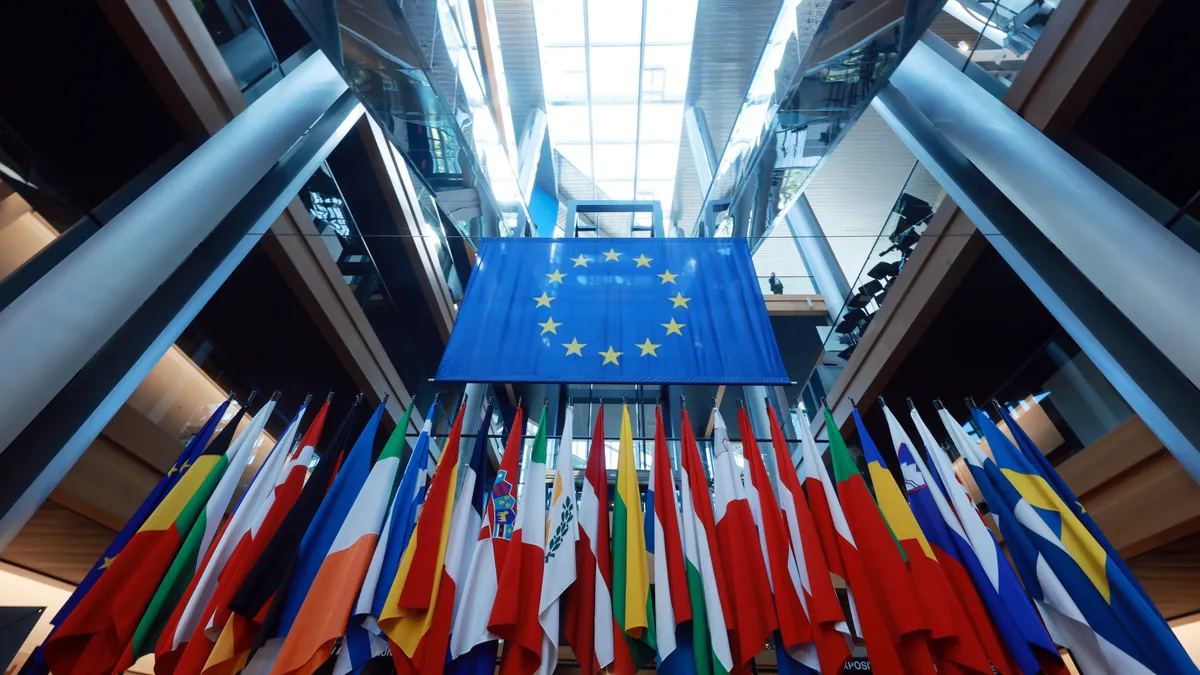Dive Brief:
- The European Parliament voted Wednesday to significantly scale back the European Union’s corporate sustainability laws. Under the changes both the Corporate Sustainability Reporting Directive and Corporate Sustainability Due Diligence Directive would be simplified, with the threshold for compliance raised, according to a release.
- Under the suggested changes, the CSRD will now only apply to companies with more than 1,750 employees and 450 million euros (over $523 million) in revenue. Meanwhile, the CSDDD will only apply to even larger companies, with more than 5,000 employees and 1.5 billion euros (over $1.7 billion) in net revenue.
- EU legislators working through simplifying the laws previously approved a delay in reporting for companies for both regulations until 2028. The changes will now go to the EU member states for ratification and any additional changes.
Dive Insight:
The changes approved by Parliament this week also include the removal of a requirement for CSDDD companies to issue transition plans compatible with the Paris Agreement. Additionally, liability for CSDDD will reside at national levels, rather than at the EU level, according to the release.
The revisions come as part of a simplification process initiated in February, when the European Commission adopted an omnibus proposal of changes. That package — which proposed raising the CSRD’s compliance threshold to 1,000 employees and either 50 million euros net turnover (over $52 million) or a $25 million euro (over $26 million) balance sheet — would have removed an estimated 80% of companies from the law’s scope.
Parliament’s proposal was supported by 382 members of parliament, with 249 members opposing the measure and 13 abstaining. Heading into the process, the Parliament was split on simplification efforts, a policy advisor for the European Greens said in the spring.
Jörgen Warborn, a member of the European People’s Party, said in the release that the vote shows “Europe can be both sustainable and competitive,” adding that the bloc is “simplifying rules, cutting costs and giving businesses the clarity they need to grow, invest, and create well-paying jobs.”
Over the spring, legislators from the European Parliament and European Council each passed a stop-the-clock proposal, delaying compliance for the next round of CSRD reporting companies — which included non-EU entities — to 2028. The legislators also pushed the first wave of CSDDD compliance back a year, also to 2028.
The changes were panned by environmental group the World Wildlife Fund, which accused the European Parliament of “turn[ing] its back on climate and nature, people and business” in a Thursday statement.
“These laws that provided hope, security, and promise for a fairer and more sustainable future have been reduced to performative exercises that have little effect on the real needs of people, nature, and businesses,” said Mariana Ferreira, WWF’s sustainable finance policy officer for its Europe office.
PricewaterhouseCoopers Sustainability Assurances Leader Kevin O’Connell told ESG Dive the changes “highlight how quickly expectations are evolving across markets,” and should give “companies a chance to focus on transparency, consistency and connected data.”
“For U.S. and other multinational businesses, this is a moment to step back and make sure their data, reporting and governance are working together to deliver reliable insights across jurisdictions,” O’Connell said in emailed comments. “Even as the requirements become simpler in parts of Europe, companies still face growing scrutiny from investors, regulators and customers who want credible, comparable information on performance and progress.”
KPMG Global Head of Corporate & Sustainability Reporting Mark Vaessen told ESG Dive Friday that the changes to the CSRD reduce the amount of companies covered to just 5% of the original population and “marks a significant shift from the initial ambition.”
“The latest move reflects the political momentum in Brussels towards removing reporting requirements on companies,” Vaessen said in emailed comments. “While this week’s decision marks another important milestone in sustainability reporting, it’s important to remember it isn’t the endpoint. Negotiations between the co-legislators now need to kick-in to reach a full agreement and become effective in all EU member states.”
Negotiations with the European Council and member states will begin Nov. 18, with a goal of finalizing changes by the end of the calendar year, according to the release. The European Council has already signaled a pro-simplification stance.












